Establishing online reputation management can be helpful to ensure the health of your online reputation.
What is online reputation management for your business?
Your online reputation determines a lot for your business. According to Forbes, 97% of businesses agree that online reputation management is important.
In recent years, people have taken to social media and search engines to find out more and communicate with businesses, no matter what your industries.
However, as you may have known, the internet is a double-edged sword. All it takes is a delayed social media response to disintegrate your brand reputation.
Nearly 92% of people read online reviews when looking for a local business before they make a buying decision. And nearly 43% won’t deal with a business with less than a three-star rating, while 40% form an opinion about your local business after reading. That’s what makes online reputation management so crucial for your business.
What is online reputation management?
Online reputation management is the process of managing your online reputation and improving your audience’s perception of your brand.
To do so, you may need to continually monitor, listen, and respond to mentions about your brand on the Internet to improve the way people perceive your brand.
How does online reputation management work?
As a person, you would consider your reputation or what other people think of you as necessary. The same goes for your business. Your online presence determines the longevity of your business.
Online reputation management utilizes several tools to control and determine what comes up when your business is mentioned.
Of course, we can not control what people think, but you can influence them by showing relevant images and content related to your business. That is considered online reputation management. This data will, in turn, help them to formulate their own opinion about you.
Why do you need online reputation management?
Why is online reputation management so important? In a world where information is at the tip of your fingers and consumers are making decisions in the blink of any eye, you must be prepared to wield influence over the public’s view. In fact, many businesses will succeed or fail based solely on your ability to successfully market your brand.
In 2017, there was a passenger being forcibly removed from a plane. Videos and Tweets spread like wildfire, making the incident the number one trending topic during that time. Due to this, the airlines’ shares dropped, and their customer satisfaction indexes ranking near the bottom for several years. This tells the importance of managing your online reputation.
People will find unfriendly reviews or criticisms of your brand. Your job is to monitor what people are saying about your brand and prevent any conversations that can damage your brand image.
That said, there are many reasons why managing online reputation is crucial, and here are some of them.
- Influence your audience’s purchase decisions
As I have mentioned earlier, your online presence affects consumer buying decisions and sales. Consumers will usually read online reviews because of making a purchase. And that helps them in their decision-making. In other words, having a good online reputation can increase or decrease your sales and buyers.
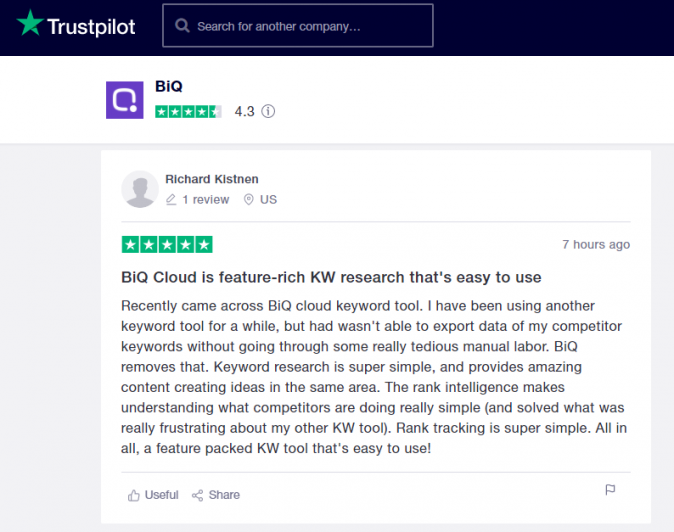
- Bad things can travel as fast as lightning.
Just look at how United Airlines got into after removing a passenger from its plane. The anger was not limited to the U.S. but also China, and it attracted more than 100 million views!
Nowadays, it’s incredibly easy to share your experiences with the rest of the world in a few clicks. Depending on your customer service, product quality, response time, or delivery, customers can leave your business a 1-star or 5-star rating. Keep in mind that word of mouth is very trusted, so it is really important to monitor your online reputation.
- An opportunity to build trust
Businesses build brands for many reasons, but trust is a primary one. Chances are, if a person doesn’t trust a brand, they won’t buy. This is a part of online reputation management. A brand that is trusted can sell just about any product. For example, if you are selling a new body scrub, your customers will be quick to buy if they see a good word about your brand spreading around.
How do you manage your online reputation?
1. Access your current online reputation
First thing first, determine what your actual reputation is.
What do people already think about your brand? Does your digital presence match your reputation in your offline network?
You may ask friends, family, clients, and business partners what comes to mind when they hear about your business’s name.
Or you can also use organic search to find out what people are saying and what content is being associated with your brand. When you Google your business or brand name, you can see a lot about your online reputation.
Here are some searches you can try:
- Your company name, brand name, product names
- Common misspellings of your company or brand name
- Your brand in a positive light, “best florist, Mary Daisy Florist”
- Your brand in a negative light, “worst florist, Mary Daisy Florist”
Don’t limit yourself to web pages on Google. You may also assess your current online reputation on other search engines or social media platforms. Try the major ones, including Quora and Facebook.
There is no golden rule in determining whether you have a good or bad online reputation. But if you see your brand included on the first page of search engines that are negative, there’s always room for improvement.
2. Have a good feedback management system
52% of people around the world believe that companies need to take action on feedback provided by their customers. That said, it is important to respond to them to help you make your brand look good in the eyes of your customers. Whether they are positive or constructive, you show that you care about the customer experience.
That said, a good feedback management system helps you to put a system in place for receiving and processing feedback. From there, you may also use them to improve your performance.
Here are some customer best practices on how you can get better feedback
- Live chat with customers on your website
This flexibility allows them to talk to you right on the site without having to hunt your company down on social media, email, or wait for an answer. It allows you to quickly hear what their problems are and allows you to find solutions to those problems before they vent out their frustration anywhere else.
- Always respond to reviews
Take time to read and answer all reviews carefully. In fact, customers said they are 87% more likely to book again if their review was applied to TripAdvisor and 57% of potential customers viewed the feedback as a vital part of their buying decision.
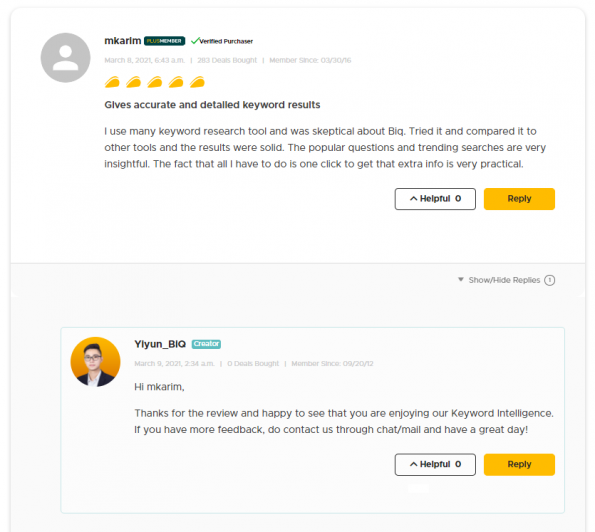
- Respond on social media
If your business has a social media page, it is likely that you receive questions, feedback, and complaints from customers frequently. Today, more and more customers are turning to social media as a source for customer service; they are always looking for fast replies. So it’s important to respond to their queries as soon as possible.
According to a survey, 42% of the customers expect a less than 60-minute response time for their answers to their queries.
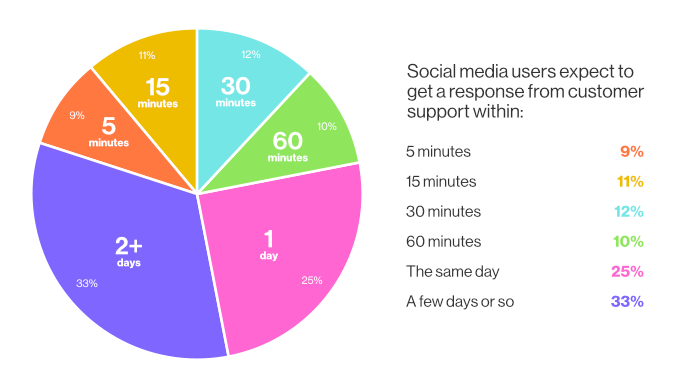
How you respond to unhappy customers will show others you care about the customer’s wants and needs and conveniently respond to questions they may have regarding their order.
With various tools in your marketing budget arsenal, you should be equipped to respond relatively quickly to complaints. Being polite, helpful, and relatable will help you attract more clients and create repeat customers.
3. Get positive reviews from customers
Positive reviews are a great way to leverage social proof for your business. It is useful anywhere potential customers go to make up their minds.
If you don’t already have reviews to use for your business, fear not! Here are few ways to get your customers to write positive reviews:
- Ask, and you shall be given – don’t wait for customers to come to you to ask them for a review. Start a conversation and ask for reviews right after a service is completed. Better still, I would highly recommend automating your feedback process. It will save you and customers time, and it makes the process a lot easier.
- Offer incentives or rewards – incentives like discounts can help to increase response rates but use them carefully.
- Make it super easy to leave feedback – add a survey to your site and live chat. If your customer has a quick and easy way to communicate with you, you’ll be able to address any issues fast before they escalate to social media.
- Get several spaces to find reviews – get your customers to reviews on several other listings like G2, TrustPilot, and Product Hunt. It’ll help to boost your product’s credibility, giving potential customers more confidence in your product.
Most importantly, be honest. Never cut corners to reach a place where you want to go. You might reach your destination late, but people will value you more than if you were not honest.
4. Control search engine results with high-quality content.
Creating high-quality content can help improve your online image and help define your brand.
With the right keyword and high-quality content, it can boost your probability to drown unwanted content further down the search result pages.
Now let’s look at the two crucial strategies to creating your next great content.
- Use BiQ’s Keyword Intelligence to target the right keywords
Validating the right keyword may result in success in the right direction. For instance, some keywords can be more competitive than others or aren’t the best fit for your niche. To tackle this, you may use BiQ’s Keyword Intelligence.
The keyword research tool allows you to gather data on keyword volume, trends, keyword competition, related keywords, and more.
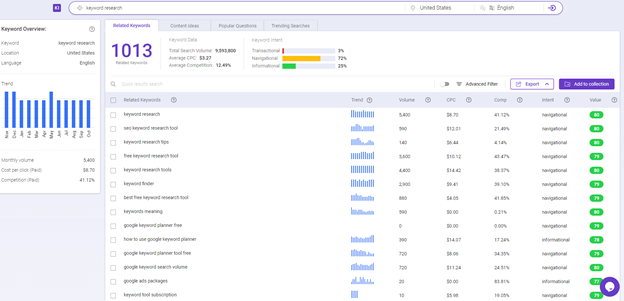
What makes BiQ’s Keyword Intelligence stand out from the rest of the keyword research tools on the market is the keyword analyzer feature. It helps you see why someone might be searching for the keyword in the search engine. With this data, you will be able to plan your content in such a way that meets your users’ needs.
If you are unsure which keyword to use, you can sort the keywords based on their value. The higher valued keyword means it can potentially bring more traffic to your website at a lower competition.
- Use BiQ’s Content Intelligence to boost content relevancy
Assuming that you have a great keyword in hand, you need to know what goes inside your content. The typical practice for a content writer to do this is to hop over to Google, type the keyword in, and open a dozen tabs consisting of the top articles.
The problem is it takes so long, and human observation is prone to error. This is where BiQ Content Intelligence comes in handy. For any keyword of the document created, the tool analyzes it with the top-performing organic content on Google.
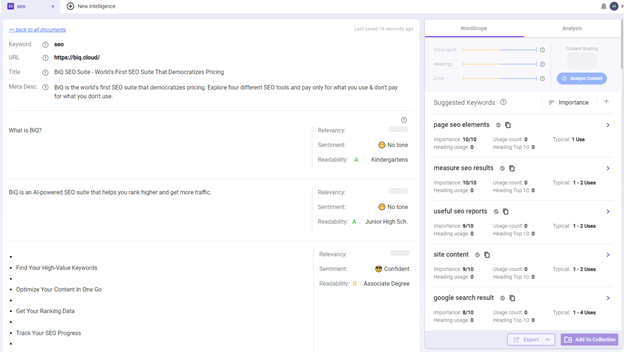
Better still, it gives you a breakdown of your keyword in terms of usage, similar keywords, and example sentences.
They should be the go-to-source that shapes your article as you write. For example, if you’re writing about “unrealistic standards,” just by running a Wordscope analysis can get you similar keywords like media standards trust, what is media ethics, and so on.
In other words, you can’t hope to satisfy searchers who are looking for unrealistic standards without writing about these similar keywords.
You can also make use of the keywords to craft your outline! That’s an example of killing two birds with one stone effectively.
Publishing content on your blog consistently will help to get more people to know about your brand. As a result, they will be more willing to buy your product or service. Other than that, blogs are also a perfect place to share your values and create the image of an expert. Make sure to leverage them today.
5. Create a strong social media presence
Social media started with a boom in the world of the Internet, and we know that it is here to stay. As a regular user of social networking sites, I see people constantly sharing their respective views as well as promoting brands on multiple social media platforms.
As for business owners, this is the opportunity you can leverage to improve your online presence. You may use them to communicate with customers, engage with the audience, reach potential markets, and more.
Here are some tips you can use to create a strong social media presence:
- Choose the right platform – research which platforms your target audience hangs the most.
- Maintain constant presence – it takes time and lots of patience to foster a constant and reliable presence. So make sure to create effective posts on a regular basis, to stay connected with your followers.
- Interact with your audience – talk and respond to your followers actively in any possible way. You can reply to their comment on your post, read their messages, ask for their feedback, etc. Interaction with the audience builds trust and a long-lasting relationship, which helps your brand grow.
- Share your best reviews – share your best reviews on any of your social media profiles. This will help drown out negative noise and improve your search visibility.
- Use a social listening tool – it can be difficult to track every single conversation about your business happening on every social media channel. Here is where social listening tools can help you effectively listen to your customers’ voices on social media.
5. Monitor your brand online regularly
Proactively monitoring online conversations or mentions about your business gives you a real-time view of your online presence. By doing so, you will be able to know what is being said and where things are being said so you can proactively participate in the conversations.
Monitoring your brand regularly also allows you to learn what you are doing well, what you are not doing well, why do people do business with you and a whole lot more valuable insights about your business.
There are many tools you can use to make your online reputation management easier. One of them would be Google Alerts. It is a free way to monitor specific keywords across the web.
You can set up Google Alerts that coordinate with phrases, and when mentioned, alerts will come straight to your inbox by accessing Google Alerts.
Conclusion
Managing your online reputation is so important these days for every business, since we live, work, and breathe online. On the other hand, negative feedback is inevitable for every business, but there are ways to combat it and prevent it from continuing to happen.
At the end of the day, you want to make your customers happy and satisfied with your products and services. Find out where your business stands, build up your online presence, constantly monitor your online presence and have plans in place for when the worst may happen.
Online reputation management is both a science and an art. It may take time for you to master them, but it will absolutely be worth every resource you put into it.




